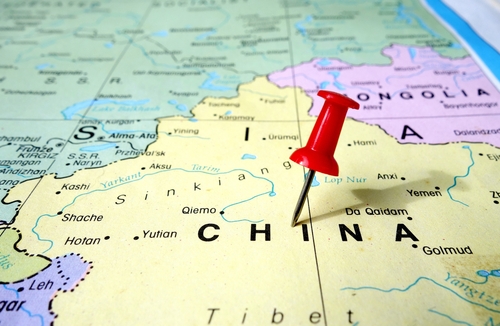
Credit: Shutterstock
Oasis P&I have published a new circular, updating the handling of crew detected to be Covid positive in Chinese ports.
More specifically, Oasis notes that in dealing with such kind of cases, owners ”will suffer from some costs and delays.” In particular, we have received queries regarding the following points:
Second test of the positive crew members
Once one or more crewmembers are tested positive by the customs, owners’ request for a second test is usually not easily entertained, even after weeks of isolation on board.
Therefore, owners are recommended to supply self-aid Covid-19 test kits on board, in case there is a need to confirm the crewmember’s condition and to enhance their petition to the port authorities. We would, however, forewarn that self test results may not be accepted by the authorities
Isolation after hospitals discharge
According to China’s Prevention and Control Plan on COVID-19, both confirmed cases and suspected cases shall be quarantined for medical treatment in designated medical institutions.
If the confirmed cases comply with the discharge standard after treatment, the crew will be transferred to a designated hotel for 14 days’ quarantine, and during this period, their health status will be monitored.
For the suspected cases, once their nucleic acid test is negative for two consecutive times and his IgM antibody and IgG antibody test stays negative 7 days after he is suspected as infected by COVID-19, then the suspected cases could be excluded, and they can move freely without 14 days’ quarantine at hotel.
The above mentioned is the national health authorities’ guidance for treating COVID-19 related cases, and local policies may vary from place to place, but generally speaking, local policies are usually stricter. That is to say, sometimes local authorities may require the suspected cases also get 14 days’ quarantine after discharge from a hospital, but they will not allow a confirmed case to be exempted from the 14 days’ quarantine after discharge from a hospital
In addition, OASIS says that there might be an exception to this that if the crew in a confirmed case has been cured and can be discharged from hospital, and the vessel is scheduled to depart from China soon, the local authorities may consider allowing the crewmember to return to vessel without further quarantine in China.
Terminals’ claims
When one or more crewmembers are found positive to Covid-19 test, the cargo operation will usually be suspended until a work plan is decided or approved by the various local authorities.
This means that the vessel has to occupy the berth idly until she eventually vacates the berth or resumes cargo operation. In case of crew change at berth, such idle occupation of the berth will be much longer. On such occasions, the OASIS has seen different attitude of terminals in terms of their claims against owners:
- Waive the idle berth fee in exchange for the vessel’s soonest departure without cargo operation or crew change to minimize their risks and idle berth occupation;
- Claim berth fee either on basis of normal berth rate of RMB0.25/day/NT or on basis of non-production berth rate of RMB0.15/hour/NT;
- Claim loss of income in tort;
- Claim both berth fee and loss of income.
According to relevant regulations, the terminal can charge non-production berthing fees if the vessel occupies the berth without any cargo operation or stays there for more than 4 hours after completion of cargo operation for owners’ reason. If the terminal claims normal berthing fee or non-production berthing fee, the burden of proof is much less. Generally speaking, the simple fact of occupying is enough.
Usually, the claim amount of income loss is much more than the non-production berthing fee but the terminal’s burden of proof is much heavier.
Theoretically, owners may have a chance to defend the claim on basis of force majeure which depends on the actual situation of each case. In practice, however, terminals usually exert pressure on vessels by making use of their advantageous position in controlling the vessel’s departure, and insist on quick settlement before the vessel’s departure even though they have not disclosed their financial data yet. Ideally, a security can be put up to the terminal first to secure the vessel’s timely departure, leaving the claim to be dealt with afterwards
Agency fees
What is more, agency fees vary substantially from case to case. In some cases, the agency fees were found to be exaggerated and difficult to be negotiated downwards.
Generally, OASIS recommends owners to seek a fee quotation from the agent beforehand for handling of the various procedures, either from the charterer’s agent or a separate owners’ agent, and compare the quotations if possible.
At the time of appointing the agent, it is advisable to make it clear that all costs and disbursements incurred need to be supported by invoices and vouchers and they will be scrutinized afterwards
Moreover, other recommendations for operators would include the following:
- Try to avoid change of crew coming from high risk areas, or avoid crew change at ports in high risk areas, if possible.
- Joining crew members should hold vaccination certificate and negative nucleic acid test report. Nucleic acid test methods should include swab and serum test as far as possible. If necessary, nucleic acid test should be carried out several times to confirm the crew’s negative result before embarkation.
- When the vessel is in a high risk port, crewmembers shall take all necessary precautions including wearing sufficient and proper PPE and avoid physical contact with shore personnel as far as possible. Furthermore, disinfection of exposed vessel areas is recommended after completing the cargo operation.
- During the voyage to the destination port, the temperature of crew members shall be taken regularly and recorded to monitor their condition continuously.
SOURCE READ THE FULL ARTICLE
https://safety4sea.com/what-to-know-about-handling-positive-covid-19-cases-at-chinese-ports/